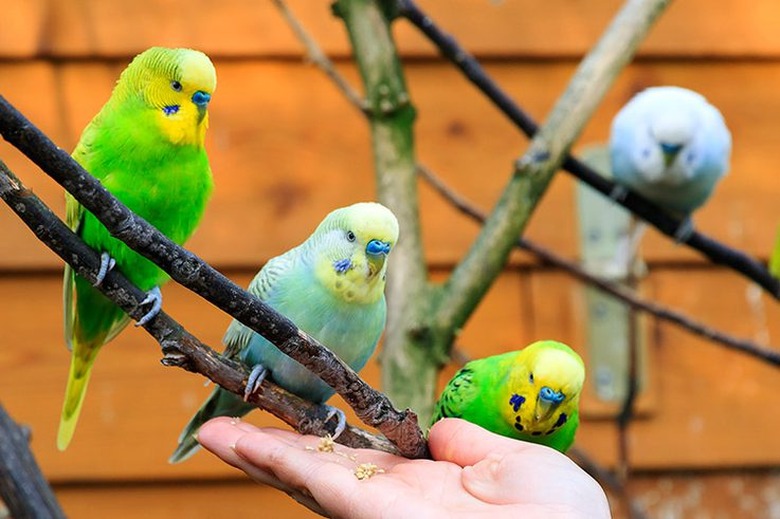List Of Foods I Can Feed My Parakeets
Humans have been keeping parakeets as pets for thousands of years. If you're new to these beautiful birds with big personalities, you might want to learn how to build a nesting box for your parakeet or what kind of birds can live with a parakeet, but the first thing you should know is what you can feed them.
According to Animal World, these colorful birds have excellent eyesight and can live an average of 10 years in captivity and larger birds of this species may live up to 25 years. To keep your parakeet healthy and happy, the Association of Avian Veterinarians recommends that you feed your bird both specially prepared store-bought mixes and a mixture of fresh fruit, vegetable, and proteins.
Supplement with snacks
Supplement with snacks
When the average person thinks about what a pet bird eats, the mind likely goes immediately to seeds. And this is partially true, but a healthy bird doesn't exist solely on seed. Beauty of Birds reports that seed mixes do provide minimal vitamins and minerals, which are imperative for a healthy, long life but they also have high-fat content, which can wreak havoc on your feathered friend. You should supplement any seed mix in your parakeet's diet with vegetables, fruits, and other proteins.
Just like people, your bird will take pleasure in getting occasional treats for budgies. A healthy, tasty parakeet treat might include baked garbanzo beans, almonds, or even peanut butter smeared on a celery stick. Other parakeet foods that you can serve in moderation are pasta, rice, or grains. Make sure these items contain whole grains, which have better nutritional content.
Provide protein sources
Provide protein sources
Since wild parakeets would be snacking on worms and other insects, you should supplement their diet with protein. Although parakeets obtain some of their protein from seed mixtures purchased in the stores, parakeets can enjoy fresh sources of protein occasionally like tuna packed in water, hard-boiled eggs and other cooked meats. Just be sure that any meat your parakeet eats is thoroughly cooked and free from sauces, brine, or other additives that could make him sick.
Raw or cooked corn is another good source of protein. Some birds enjoy cottage cheese and peanuts, too. Be sure to limit fresh protein to a small nibble — a fingertip's worth — to every two weeks.
Vary with veggies
Vary with veggies
Vegetables play an important role in keeping your parakeet healthy. Vegetables contain vitamins and minerals that help keep parakeets strong, according to Old Farmers Almanac.
Green, leafy vegetables like romaine, spinach, kale, and dandelion leaves provide vitamins K and C, as well as fiber, calcium, and iron. Fresh broccoli contains vitamins A, B, C, and calcium while spinach and alfalfa sprouts are rich in vitamins A, E, and K.
Other nutrient-rich choices are carrots, zucchini, asparagus, and potatoes. Root veggies like sweet potatoes, carrots, and beets are also good feeding fodder, along with cabbage and squash. You can also try cooked corn and beans, the latter of which offers a good source of protein.
Beauty of Birds recommends that a parakeet should eat approximately ½ to ¾ cup of fresh vegetables every day. Some parakeet owners may opt to supplement their pet's diet with baby food made from all-natural ingredients that contain vegetables. These are convenient if you do not have any of these fresh vegetables on hand, but your parakeet may prefer the fresh varieties.
Feed them fruits
Feed them fruits
Another important source of vitamins, minerals, and antioxidants comes from fruit sources. Slice up a few grapes or bananas, or thread a round slice of orange, melon, or peach on a string and hang it near a perch for your parakeet to peck.
Parakeets in the wild regularly feast on berries and other small fruit, so including blackberries, raspberries, chopped strawberries and cherries will be well-received parakeet treats.
Remove pits and seeds of the fruits and clean the fruit before giving it to your bird. Cherry and peach pits contain chemicals toxic to your budgies and you should also steer clear of avocados. If you are unsure of whether or not it is safe to give your parakeet, it is best to ask your veterinarian before feeding it to your bird.
Provide pelleted parakeet food
Provide pelleted parakeet food
Pellets can be included as part of a healthy diet as they give parakeets a great deal of variety and nutrition in one bite. Though the ingredients vary by manufacturer, pelleted parakeet food often contains grains, protein (like eggs), and several essential vitamins, minerals, and amino acids.
Pellets are generally small enough for birds to eat without your help, but if your parakeet is picky, you can also crumble it up to make it easier or more appealing. Although artificial coloring can be attractive to parakeets, varieties that don't contain artificial flavors or colors will be healthiest for your pet.
